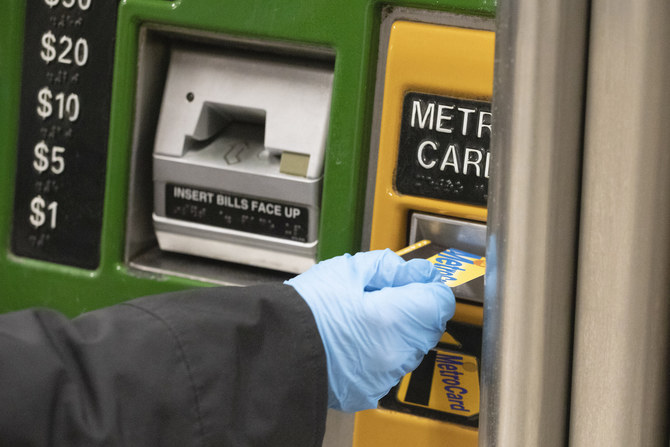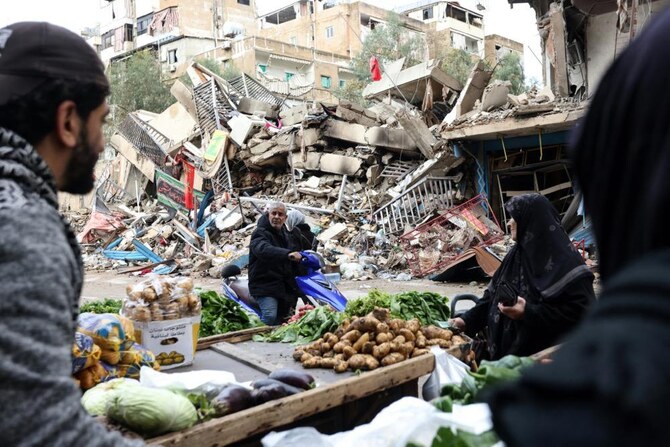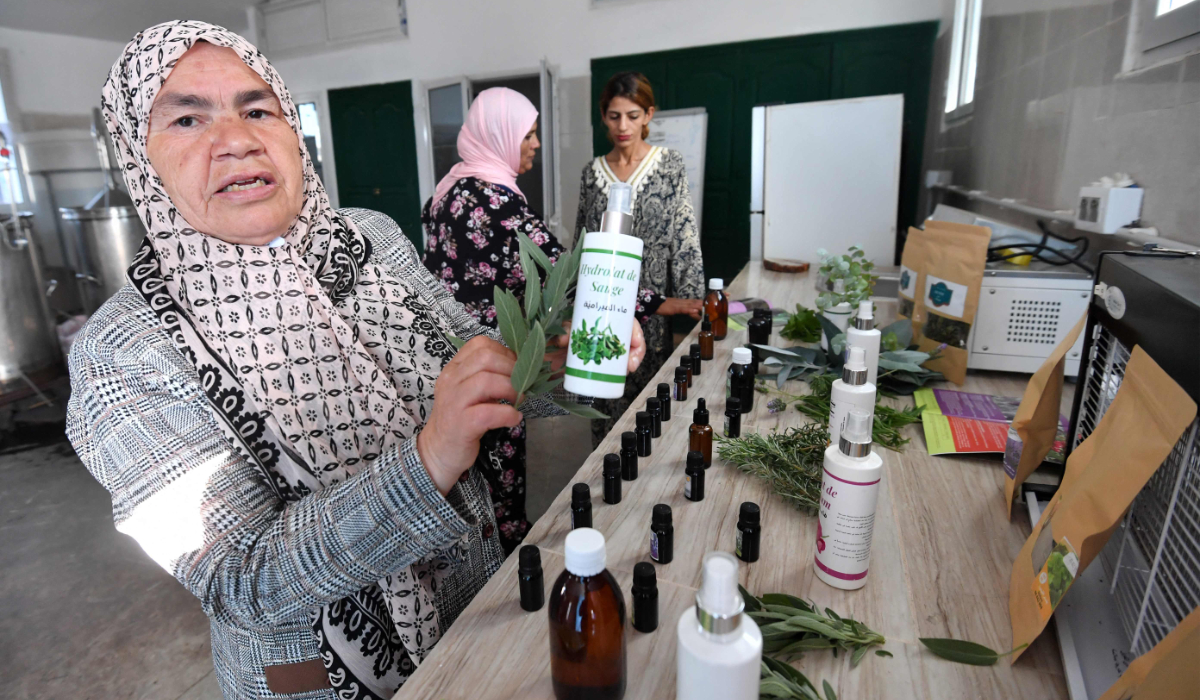DUBAI: The UAE closed its schools and Saudi Arabia announced a second coronavirus case on Monday as Middle East countries are took further steps to prevent the spread of coronavirus in the region.
Wednesday, March (all times in GMT)
20:45 - Ireland's health ministry on Wednesday said it had confirmed four new cases of COVID-19, two males and two females who recently visited northern Italy, bringing the total number of cases in the country to six.
20:38 - Iraq reported late on Wednesday its second coronavirus death in the capital Baghdad, the health ministry said in a statement published by the state news agency.
The health ministry added the patient had many chronic diseases.
20:06 - The US death toll from the coronavirus climbed to 11 on Wednesday with a victim succumbing in California — the nation's first reported fatality outside Washington state — as officials, schools and businesses came under pressure to respond more aggressively to the outbreak.

A woman wears a protective glove as she purchases a metro card at a subway station, Wednesday, March 4, 2020, in New York. (AP)
20:00 - All sporting events in Italy will take place without fans present for at least the next month due to the coronavirus outbreak.
19:45 - Algeria reported nine new confirmed coronavirus cases on Wednesday, bringing to 17 the total number of people tested positive for the virus, the health ministry said.
The cases include 16 from the same family in Blida province, some 30 km (20 miles) south of the capital Algiers, and an Italian man.
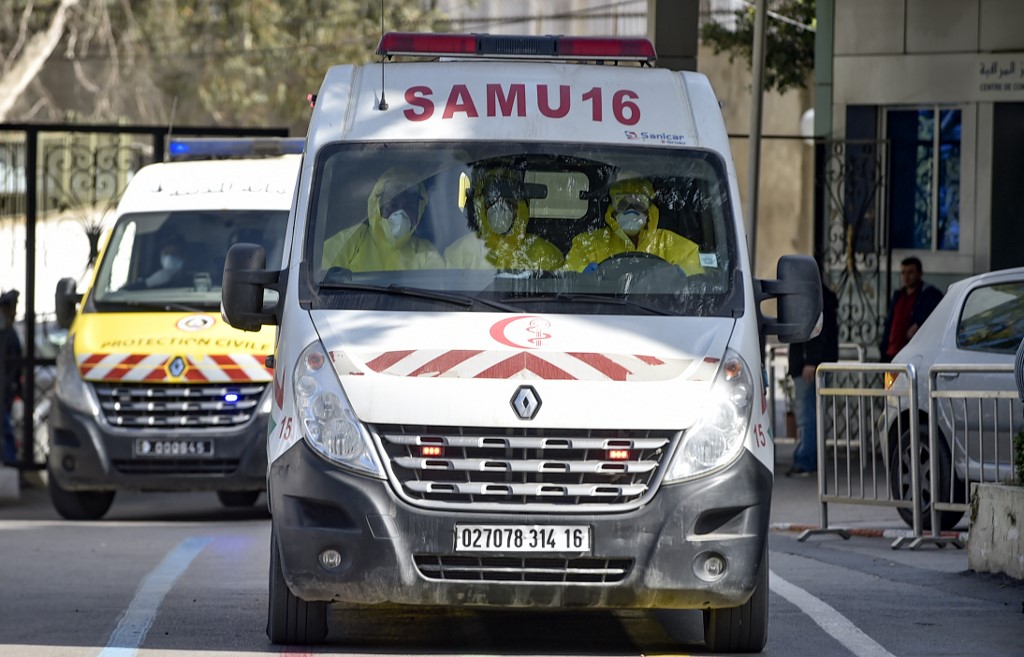
Algerian paramedics wearing protective outfits are pictured inside an ambulance in front of El-Kettar hospital in the capital Algiers. (File/AFP)
19:20 - Saudi Arabia’s health ministry announced on Wednesday a second case of coronavirus in the Kingdom. The patient is a Saudi citizen who came from Iran via Bahrain with the person who was the Kingdom's first case.
Full story here: Saudi Arabia detects second coronavirus case
19:00 - Iraq announced on Wednesday its first coronavirus death in the capital Baghdad, the health ministry said.

Passengers wearing protective masks walk with their belongings in Baghdad Airport, Iraq, Wednesday, March 4, 2020. (AP)
18:55 - Dubai Health Authority says a student has been infected with coronavirus. The student and her family have been quarantined and the school she attends has been closed.
18:40 - The UAE Pro League has suspended fan attendance in all its competitions until further notice because of coronavirus concerns.
18:15: The release of the new James Bond film "No Time To Die” has been pushed back until November because of global concerns about coronavirus.
17:14 - Health officials in Italy said the death toll from COVID-19 had jumped to 107 and the number of cases had passed 3,000.
17:00 - The total number of known coronavirus cases in India rose sharply to 29 on Wednesday, including 16 Italian tourists who had tested positive for the disease as well as an employee of a digital payments company who had travelled to Italy.

Indian students wear masks and listen to a teacher at a government school in Hyderabad, India, Wednesday, March 4, 2020. (AP)
16:41- Iraq's border port commission said on Wednesday it would halt trade between Iraq and both Iran and Kuwait for a week from Mar. 8 over coronavirus concerns, according to the Iraqi state news agency.
15:57 - Tunisia will suspend passenger ferry services to northern Italy because of the new coronavirus, Health Minister Abdelatif El-Mekki said on Wednesday at a news conference.

Emergency doctors and nurses, who have been trained to handle COVID-19 coronavirus disease cases, exit the Tunisian health ministry premises in the capital Tunis on Mar. 3, 2020. (AFP)
15:40 - Oman's health ministry said three new cases of coronavirus have been discovered in the country, bringing the total number of those infected to 15. Two of the new cases are of Iranian nationality and the third is an Omani citizen. All three cases were people who recently arrived from Iran.
14:45 – The continued spread of the coronavirus will push 2020 global growth below last year's levels, International Monetary Fund Managing Director Kristalina Georgieva said on Wednesday.
14:20 – The number of coronavirus cases in the UK has jumped by 34 in a day, to a total of 85.
13:10 – Italian media report that the government will close all schools and universities from Thursday until mid-March to help curb the spread of the coronavirus.
12:30 – The Egyptian government has decided to bar Qataris from Egypt from Mar. 6, including those who have valid residency, amid fears over the coronavirus.
12:40 – Saudi Arabia has placed a temporary ban on its citizens and residents from performing the Umrah in Makkah to prevent the spread of coronavirus according to state news agency SPA. The move follows a decision last week to close off the pilgrimage sites to foreign pilgrims.
Full report here: Saudi interior ministry imposes temporary ban on Umrah pilgrims from Kingdom over coronavirus fears
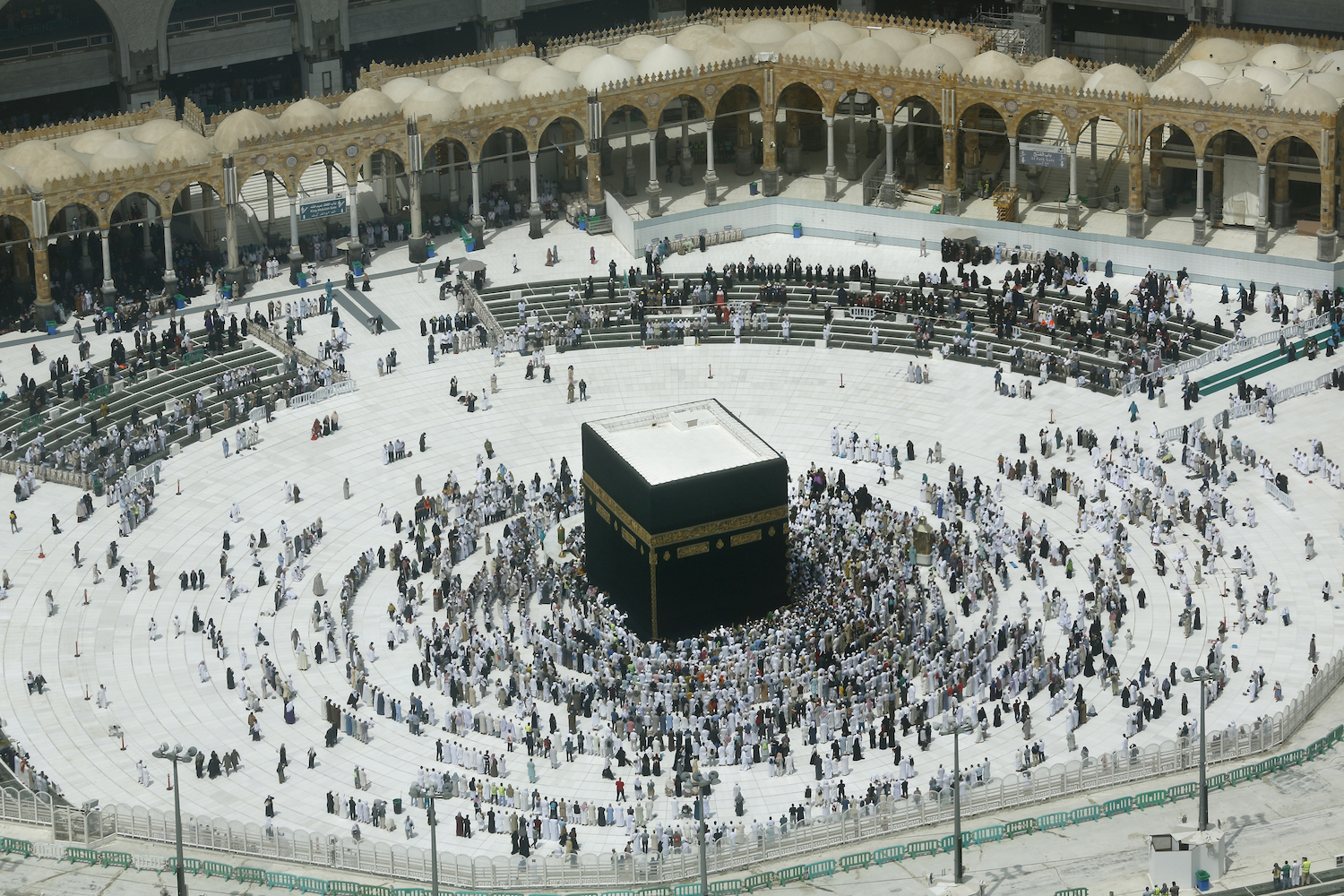
A relatively few number of Muslims pray around the Kaaba in the Muslim holy city of Makkah, Saudi Arabia, Wednesday, Mar. 4, 2020. (AP)
11:49 – Saudi Arabia quarantined 70 people who were in touch with the coronavirus patient, 51 of them tested negative, the ministry of health announced on Wednesday.
11:42 – Friday prayers in Iran have been canceled across all provincial capitals amid the country’s growing coronavirus outbreak, state television said.
11:07 – Iran said the new coronavirus has killed 92 people, after 15 deaths were reported on Wednesday, amid 2,922 confirmed cases across the Islamic Republic. Health Ministry spokesman Jahanpour announced the new figures at a news conference Wednesday in Tehran.
11:05 – Coronavirus has had no effect on oil and gas production in Iran, the deputy head of the National Iranian Oil Company said on Wednesday, according to the Tasnim news agency. “The production and distribution of Iran’s oil and gas is being carried out without any effect from the outbreak,” Farokh Alikhani was quoted as saying. Iran’s crude oil exports were cut by more than 80 percent after US President Donald Trump withdrew from a multilateral nuclear deal with the Islamic Republic in 2018 and reimposed sanctions.
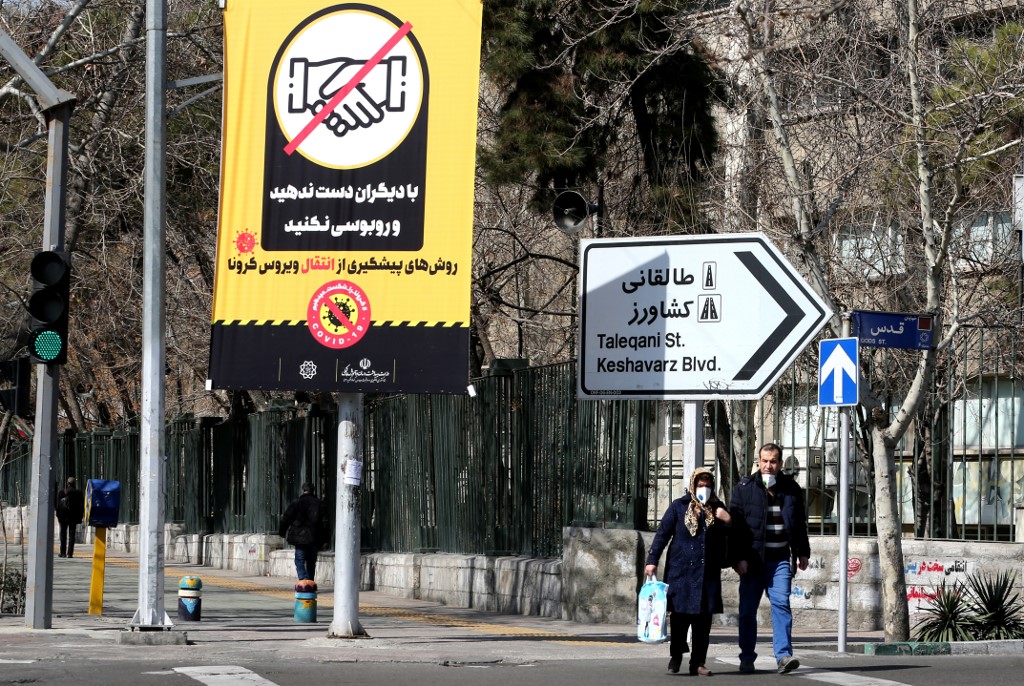
Iranians wearing protective masks walk under a prevention campaign poster for coronavirus on March 4, 2020 in Tehran. (AFP)
08:59 - Iraq on Wednesday confirmed the first death from the novel coronavirus in the country where a total of 31 cases have been reported. The deceased 70-year-old religious preacher had been quarantined in the northeastern city of Sulaimaniyah before he died on Wednesday, said a spokesman for the provincial health authority in the region.
07:12 - Kuwait health authorities said on Wednesday there have been no new confirmed coronavirus cases in the past 24 hours. They have also advised cafes in the country to avoid serving shishas to help prevent the spread of the virus. Kuwait’s Directorate General of Civil Aviation earlier issued a circular saying that expatriate passengers coming from the Philippines, India, Bangladesh, Egypt, Syria, Azerbaijan, Turkey, Sri Lanka, Georgia, and Lebanon must undergo medical examination to confirm they were free from the new coronavirus before entering the country.
Tuesday, March 3 (all times in GMT)
21:09 – The UAE’s Ministry of Education announced a four-week closure of all public and private schools and higher education institutions starting Sunday.
19:26 – Abu Dhabi’s Department of Health announced a temporary suspension of international patient care services.
Opinion
This section contains relevant reference points, placed in (Opinion field)
18:53 – The UAE’s Ministry of Health and Prevention announced six new cases of the coronavirus, in the UAE on Tuesday, bringing the number of those infected to 27.
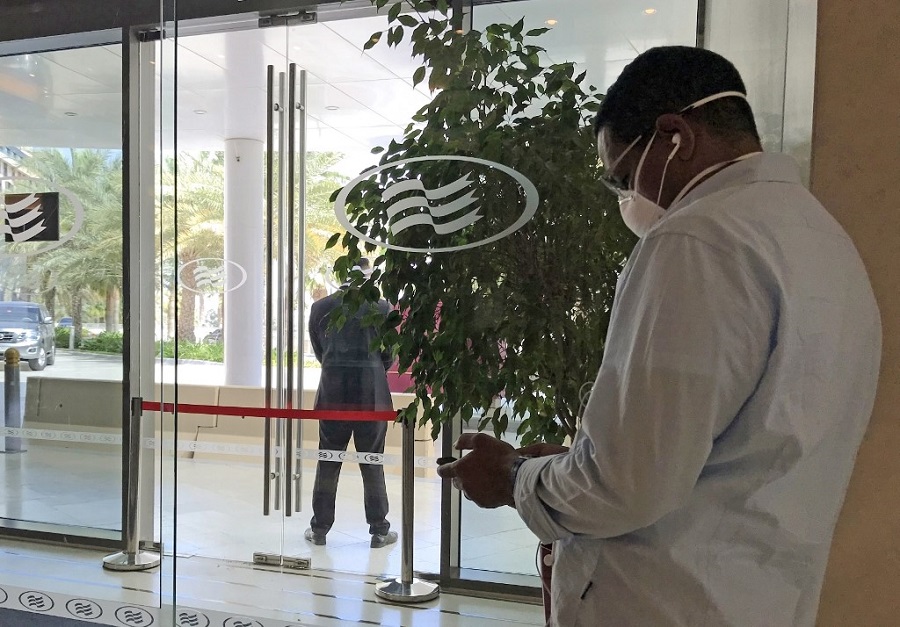
Two Italian cyclists participating in the UAE Tour tested positive for coronavirus disease which prompted the cancellation of the cycling event. Above, Crowne Plaza hotel in Yas Island Abu Dhabi, where Tour participants were billeted . (AFP file photo)
The six patients include two Russians, two Italians, one German and one Colombian. The cases were connected to the two previously announced cases associated with the cycling event, the UAE Tour.
Five of the total number of cases were previously reported to have fully recovered.
ANNOUNCEMENT: UAE TOUR REMAINING STAGES CANCELLED pic.twitter.com/kHGbvXq2w4
— UAE Tour Official (@uae_tour) February 27, 2020
13:48 – Oman’s Ministry of Health announced six more coronavirus cases bringing the total number of those infected to 12.
A statement from the ministry said, “The registration of six new cases of COVID-19 has been reported, and is related to travel to the Islamic Republic of Iran. Four of the infected are of Iranian nationality and two are citizens, all of whom are subject to quarantine. This takes the number of cases registered in the Sultanate to 12 cases.”
14:31 – The Kuwait Olympic Committee postponed Gulf Olympic Games, scheduled between April 3 and 14, to December due to the coronavirus outbreak.









